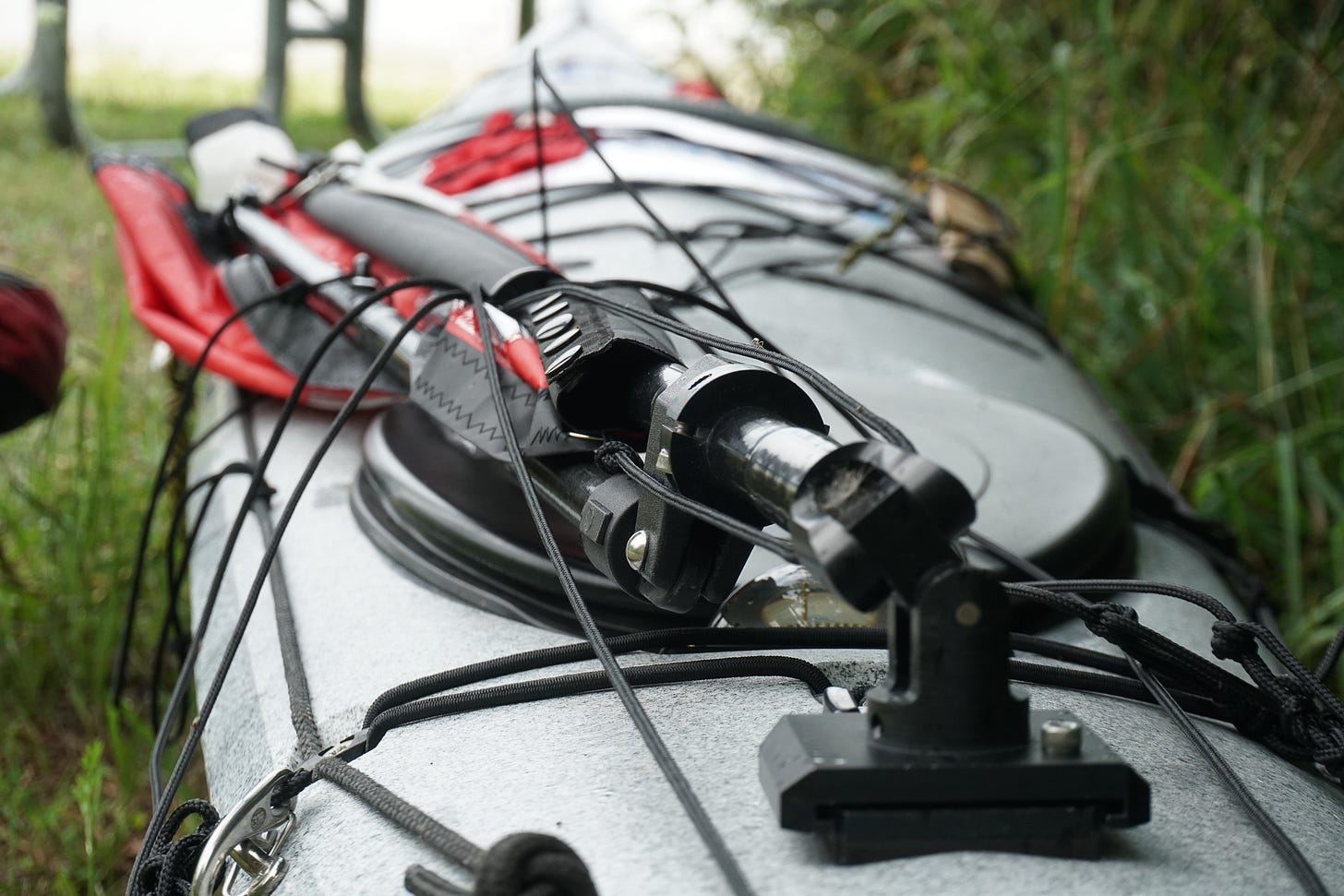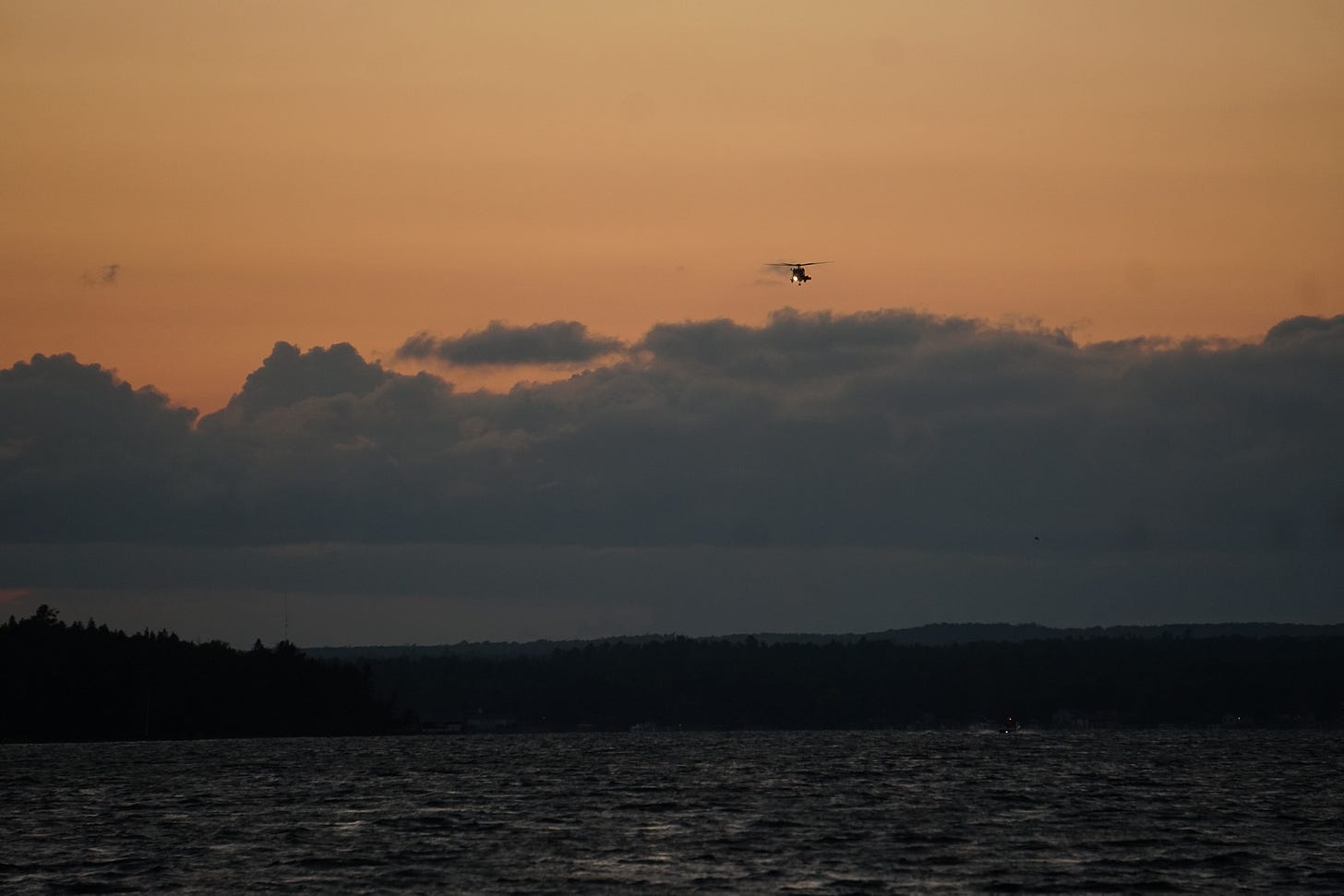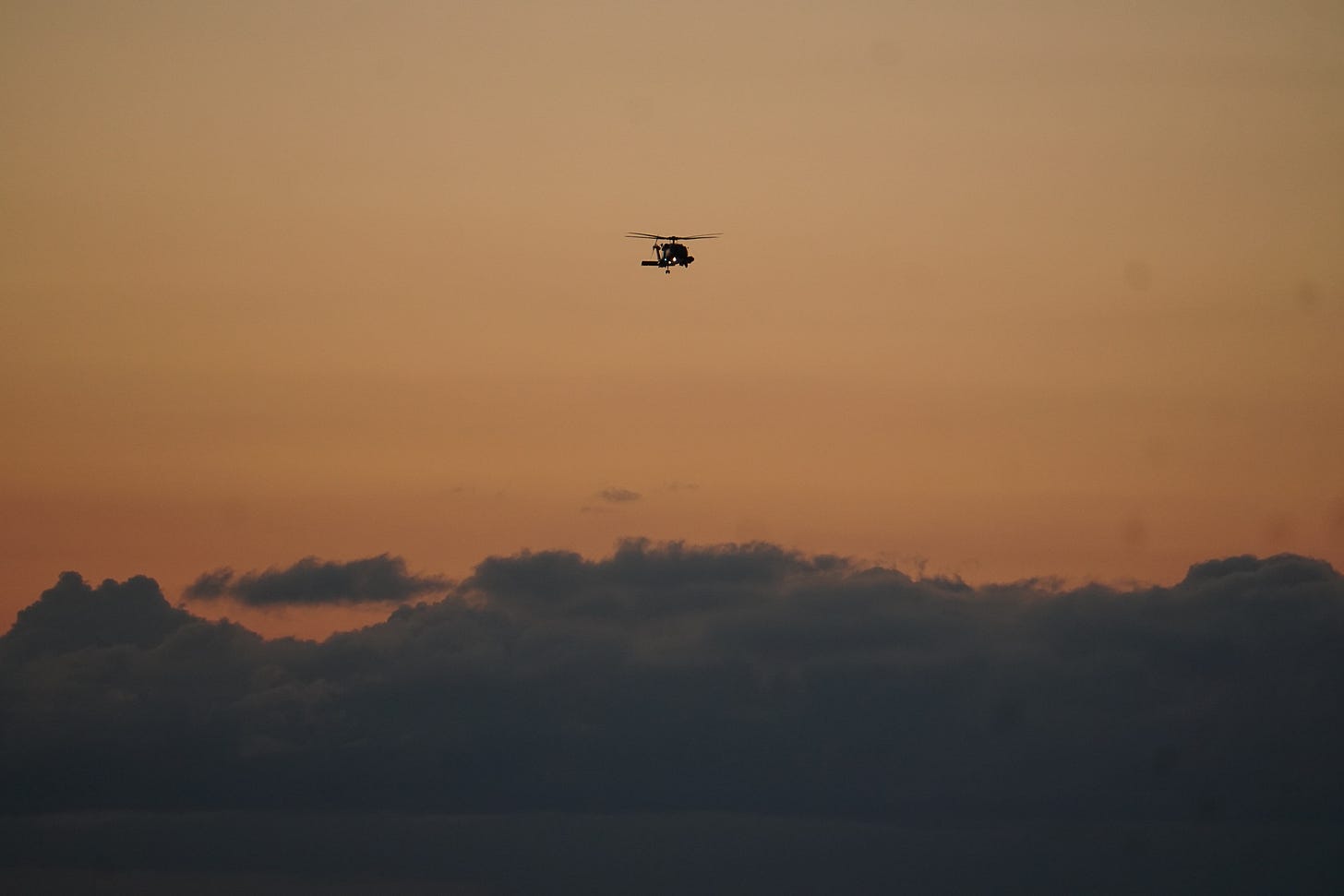The Search: Excerpts from a South Shore Paddling Expedition
Guest Writer Tim Gallaway, part 3/3
The Search
Saxon Harbor, WI to Mackinaw City, MI (2021)
Government Island, Les Cheneaux Islands, Lake Huron.
Day 27 of 30
It had been a long 4 days on the water. Four hot days to make it from Whitefish Point on Lake Superior to the Les Cheneaux Islands in Lake Huron. On previous trips I had taken the same time to paddle half the route. I was beat.
Since the day I left Whitefish Point my weather radio had been crackling out the prophecy of an incoming low pressure front. All of that heat and sun I had paddled with would simmer over the Upper Peninsula and then get washed out by the wind and storms that would come crashing in behind it. I had paddled hard to get here knowing that in this familiar bit of water, on this one particular island that I had camped on more times than I could count, I would have a perfect place to rest and wait out the winds for a day or two before continuing on my route west toward St. Ignace.
I had gotten into the Les Cheneaux Islands in the afternoon, with enough time to relax and let my sail carry me the last few miles up the channel toward the site near the end of the island that I was thinking of.
The site was raised above the water on a crumbling bank and cobble stone beach so small my kayak took up its entire footprint as I landed. Just around the end of the island is a shallow sandbar and beach and a shallow passage between islands out to Lake Huron with a smattering of campsites along the way. The island sets the corner of a wide rectangular bay that had half-a-dozen-or-so boats anchored out enjoying the summer heat.
I got lucky; the site hadn’t been vacant for long.
Whomever was in the site previously hadn’t followed Leave No Trace though–side from a few scraps of typical camp litter, they had left a smudgy smoking remnant of a fire. I drowned the smoking coals, set up camp, and after a double ration of dinner complete with an oily can of sardines added into my spicy ramen, I hit the tent and slept hard through the calm night.
(I know this is an unnecessary aside, but I had carried those sardines for hundreds of miles, all the way from day 1 actually, and they were absolutely amazing.)
My choice to take a rest day felt foolish the next morning. It was a wonderful dewey sunrise and it would have been perfect to be on the water. A bit cool, calm, and bright. The winds only started to build mid-morning, after second-breakfast.
In case you haven’t picked up on it yet, long paddling trips are spells of paddling punctuated by eating large amounts in an, often vain, attempt to recover the energy expended whilst paddling. After lunch, the winds filled in, leaving the channel in front of camp full of choppy whitecaps. Boat traffic all but ceased except for a few hardy locals making the run into or out of town. The boats in the anchorage had shifted to the northwest end to get into the lee of the bay and it felt like everyone had hunkered down. I did see the red towboat go ripping by at one point, someone must have been dragging anchor in the anchorage and needed a hand, such things aren’t uncommon in boaty places like this.
Late in the afternoon while tucked behind a wind breaking tree relaxing and reading in camp, a few people in recreational kayaks paddled down the shore getting pushed quickly by the wind, sticking close to the shore to keep out of the waves in the channel.
They were not well prepared. No PFDs (life jackets), open recreational kayaks without floatation or foot braces, and swimsuits and t-shirts. They were gone before I could say hello.
They came back, going into the wind a few minutes later and said they were headed to the campsite around the end of the island and that their friends were behind them towing some extra supplies. I told them to stick close to shore to avoid the waves and out of the deep water and they continued on. I kept an eye on them, really hoping I wouldn’t have to do an impromptu rescue, until they rounded the end and paddled slowly and awkwardly out of sight.
Their friends came by a few minutes later. The ‘towing’ that was mentioned was more of a dragging. One kayak was dragging a rubber inner-tube with a rubber made tub wedged in it, the other kayak was towing a cheap vinyl rowboat, the kind you could find at a Walmart full of all sorts of smaller bags.
They were making all of half a mile an hour into the winds. Seeing how exhausted they looked already and knowing how far they still had to go, I recommended that they pull into the trees near my camp and carry their equipment overland and come back for the kayaks when the winds had calmed. To my great relief they quickly agreed this was a good course of action and dragged their crafts into the trees and away they disappeared on the trail.
I retired to my tent early that night to escape the wind for the warmth of my sleeping bag and the comfort of my book.
The sun was still setting when a distinct whine-thunk resounded through the trees. I recognized and dreaded this sound. I had heard it many times and knew the roar. It was a Coast Guard helicopter.
I jumped out of my tent just as they flew nearly right overhead and low, with the spotlight sweeping across the water. The familiar orange paint job on the burly fuselage still obvious in the fading light. They made a hard banking turn and headed north west up the channel. In the distance, on the opposite side of the bay was a flashing blue light on the water.
Sheriff! They were conducting a search! My stomach churned with anxiety as I grabbed my VHF radio off of my PFD.
I always carry a radio when paddling overnight. Usually I just use it to pick up on the local NOAA weather report a few times a day so I can plan my actions. In busier areas, I will leave it on channel 16 to hear if anyone is trying to hail me, or I’ll tune into marina or shipping channels to keep track of boat traffic so I know who is around me.
The radio is a useful tool, and between search-and-rescue and bystanders it is usually the quickest and most reliable communication. I flipped to channel 16, the emergency and hailing channel, and turned up the volume against the wind. I adjusted the squelch and sat. Nothing. It was an agonizing first minute on the radio. Then I heard a crackly voice I couldn’t make out through the garble.
A response I could understand: the towboat captain was talking with the helicopter explaining what I had seen earlier, he had been called out because an unoccupied sailboat was dragging through the anchorage. He had zipped out to reset the hook and then gone home. That lined up.
But who were they searching for? I kept my eyes on the helicopter and the sheriff boat in the distance. The Coast Guard made a series of laps, up the channel, across the bay, big loop over the neighboring islands and then repeated each time shifting their search pattern.
They must be looking for someone in the water. My heart sank, was it the people I had seen earlier in the rec kayaks? Had they tried to paddle into Cedarville and dumped in the wind and waves?
I tried hailing the helicopter stating my name and position and asking some details on their search. Being on the lee shore of their search area, whatever they were looking for was blowing directly towards me.They didn’t respond. They were a few miles away and probably out of range of my small hand held radio, I just didn’t have the power to transmit that they did.
They did another lap, flying closer to my camp, I tried hailing again:
“Coast Guard Helicopter, Coast Guard Helicopter.
This is kayak camper on Government Island.
Looking for a description of what you are searching for,
In case I might’ve seen something.”
(Long silence)
“Kayak Camper this is Coast Guard Helicopter.
currently sir we are looking for two possible P.I.W.’s”
“10-4, any description on how they ended up in the water?
“In case it was a kayak. There were a few people that came in and landed unexpectedly earlier today.”
“Negative, not by kayak, information is that it was off a sailing vessel”
“Roger, I’ll keep an eye out. Thank you.”
“Thank you sir.”
“Standing by on one-six.”
And that was it. Something had gone wrong with the sailboat, people missing and potentially in the water. It wasn’t the kayakers I had seen earlier.
The already scarce radio chatter stopped altogether. I stood on the shore and watched the search pattern until the darkness just left points of light moving through the dim twilight and the helicopter peeled off and headed back toward the west, leaving the islands. I returned to my tent. It was a restless night’s sleep.
The next morning was bright and cool. The wind had veered to the north east and the chop in the channel and bay had calmed. I packed up and headed out, the brightness of a new morning standing in such stark contrast to the darkness and anxiety of the previous night. I paddled straight for the anchorage. Sailors tend to rise with the sun and I knew there would be someone out willing to explain what had been going on last night.
I said hello to the couple sitting at the transom of the first motor cruiser I came up to. After pleasantries I jumped right in. “What was going on with the Coast Guard search last night?”
From their conversation and what I observed from the island, this is what happened:
The couple on the sailboat that would eventually drag had been swimming off the back of their boat late in the afternoon and were witnessed doing so by their neighbors.
At some point a local friend had come by in a skiff to pick them up for dinner in town (not witnessed by the neighbors).
In the evening, after their departure, their sailboat had dragged anchor and the towboat had been called to aid.
Later that evening, they were reported missing by someone who hadn’t seen them leave and the Coast Guard was dispatched to the area.
Late evening, the anchorage, bay, and adjoining channels were searched by the helicopter and local sheriff patrol boat.
The search was concluded after dark. I am unsure if the missing boaters were reached in town and called in or what was done to conclude.
News of the search was just starting to percolate through the community of Hessel when I stopped there for lunch later that day. The friends I visited didn’t know anything more but had still heard the thrashing blades over the wind in the twilight hours. Everything ended up being fine, a false alarm, but sitting on shore that night it was real.
In a lot of ways that was more stressful than planning a long crossing in a narrow weather window, or preparing to run a big rapid,or watching a storm roll in knowing you won’t make it to shelter in time.
iIn all of those other situations I was always in control, even when things went sideways. I could make the decision that would affect the outcome, my judgment was always mine and mine alone.
To be sitting on the sidelines of something that could have life and death implications and just watch and hope nothing washed up was horrifying. Of all of the month I was paddling this route, with all of the beautiful sunsets and sunrises, laughs with friends, and lonesome shores along the way, this night is one of the times I can still feel most viscerally.
Check out The Search the video on Tim Gallaway’s YouTube, Kayak to the Sea. To catch the next installment from Tim’s South Shore kayak expedition, become a free or paid subscriber below.
Hello Stranger is currently seeking fall guest writers! If you have a travel or outdoors adventure to share, click here to learn more about guest writing for Hello Stranger!
The Search, the video
Guest Writer Tim Gallaway
Tim began his kayaking career as a guide and ACA instructor at Woods & Water Ecotours in the Upper Peninsula of Michigan when he was in college. He cut his rough water teeth on the rocky shores of Lake Superior and Lake Huron and quickly took to Greenland style paddling. In the summer of 2018 Tim traveled to Greenland to compete in the National Qajaq Championships and has a completed vlog series about his travels. In 2021 he completed a personal goal of a paddling expedition along the Michigan shoreline of Lake Superior and Lake Huron and has his sights on bigger expeditions in the next few years.





